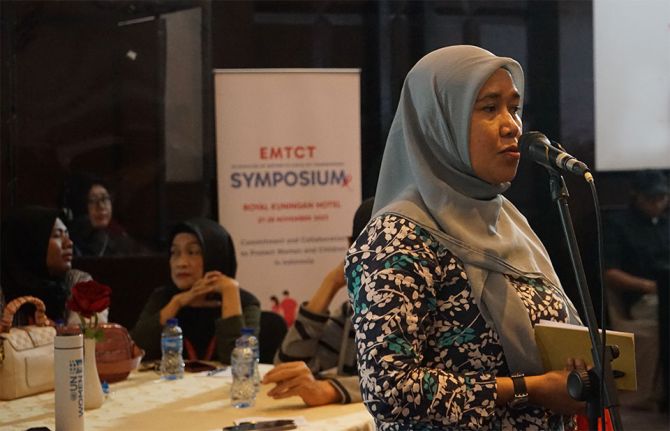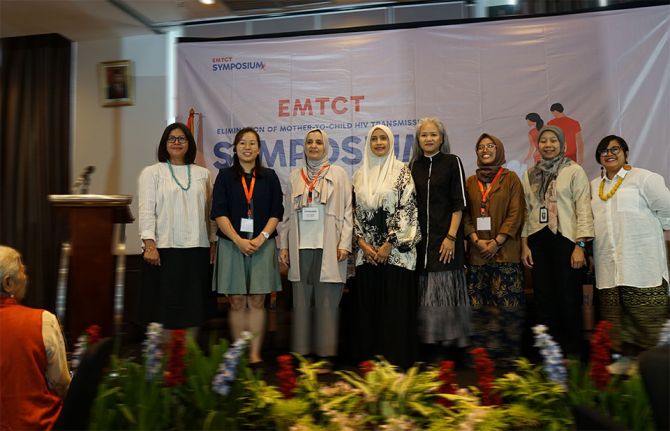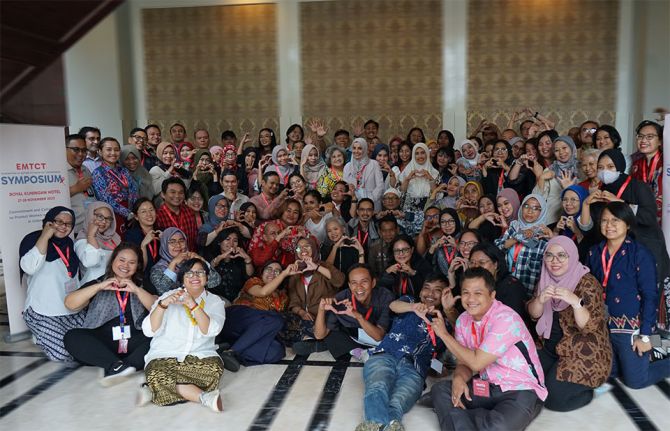



Feature Story
Community leadership driving progress to eliminate mother-to-child HIV transmission in Indonesia
07 March 2024
07 March 2024 07 March 2024Ibu Mawar (not her real name) learned she was living with HIV after receiving a test during an antenatal care visit.
“I was surprised, of course, when they told me. But I didn’t really doubt or deny the result,” she remembered from the Sorong City Health Office in West Papua. She immediately started treatment to prevent transmission to her son. “Even though I’m positive,” she said, “our child is not.”
In principle, since 2009 every pregnant woman receiving antenatal care in Indonesia should receive an HIV test. And every woman found to be living with HIV should receive medicines to prevent transmission to their babies just as Ms Mawar did.
But this isn’t yet the reality.
In 2022 more than one-third (37%) of all pregnant women in Indonesia did not get screened for HIV and just 18% of mothers living with HIV had access to antiretroviral therapy. There were an estimated 2800 new HIV infections among children that year.
But now stakeholders in Indonesia are mobilising. Not only will they scale-up prevention of mother-to-child HIV transmission services, but they will work toward eliminating vertical HIV transmission while assuring the health and wellbeing of women and children living with HIV. At the centre of this approach is the engagement of women, who comprise roughly one-third of the adult population living with HIV.
In June 2023 Indonesia established the National Alliance to End AIDS in Children. This partnership between government, civil society and international organizations seeks to provide access to health services and support for women and children living with HIV. It has committed to three main priorities. The first is advocacy for the needs of adolescent girls and children living with HIV. Second is promotion and dissemination of information on Prevention of Mother-to-Child Transmission (PMTCT), Early Infant Diagnosis, treatment literacy and comprehensive sexual education. And third is the empowerment of communities regarding issues pertaining to children living with HIV.
The Alliance’s first major initiative was an Elimination of Mother-to-child Transmission symposium—the first ever in Indonesia. Partners have embraced the World Health Organization (WHO) triple target of eliminating mother-to-child transmission of HIV, syphilis and hepatitis B by 2030. A series of sessions were delivered in-person and online. A total of 115 participants from the government, communities, academia, healthcare and media joined the EMTCT Symposium in Jakarta.
Dr. Laila Mahmudah, Head of the Neo Maternal Division at the Ministry of Health, underlined the importance of accelerating EMTCT efforts across the range of issues. She noted that currently 66% of pregnant women received hepatitis B early detection services while just 25% of pregnant women are tested for syphilis.
Multisectoral stakeholders and participants discussed strategies with participants from Malaysia and Thailand, which have both received EMTCT validation for HIV. Dr Anita Suleiman, Director of Disease Control of the Ministry of Health of Malaysia, pointed to the importance of effective leadership and health system governance for country-wide implementation.
“One of the lessons from countries that achieved EMTCT is that it is possible to end AIDS and vertical transmissions, especially in low-prevalence regions like Indonesia, through robust governance and good-quality performance. Indonesia can also achieve EMTCT by 2030, and I hope this symposium leverages the coordination efforts towards the elimination of HIV, syphilis and hepatitis B,” said Dr Shafflq Essajee, Senior Advisor, HIV, UNICEF New York.
However, it was emphasised that political commitment must be bolstered by community-led strategies to reach and retain mothers living with HIV. Community mobilization and community health workers are critical approaches. Ikatan Perempuan Positif Indonesia (IPPI), the national network of women living with HIV, also endorsed the Thai approach of providing free formula for mothers living with HIV in low-resource districts.
Ayu Oktariani, IPPI National Coordinator and a member of the National Alliance to End AIDS in Children reiterated her organization’s commitment to implementing the community-led strategies in support of EMTCT in the coming years.
“This Symposium means more than words I can explain,” said Ayu Raka from the Akar Cinta Kasih Foundation, a community organisation in Bali. “When I return to Bali, I will advocate for EMTCT with local multisectoral stakeholders and communities in my region. I am confident we can make a healthier society and improve health for all mothers and babies.”
UNAIDS Country Director for Indonesia, Krittayawan Boonto, promised the continuous backing of UNAIDS.
“We will continue to support not only mothers, but also fathers, in protecting babies from new HIV infections. I wish for Indonesia to become the fifth country in Asia Pacific to achieve EMTCT. But we can only do it with the leadership of communities,” she ended.



